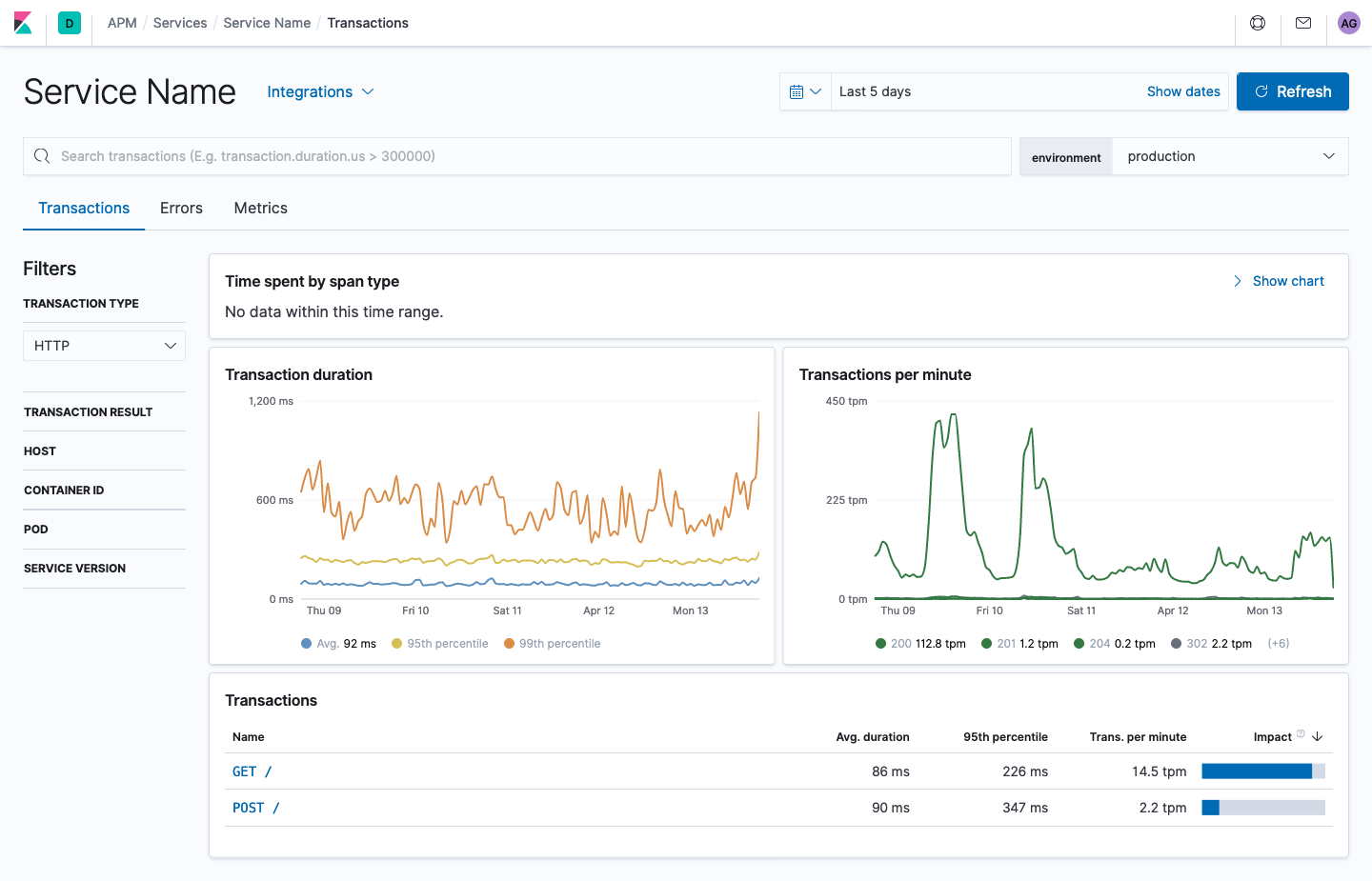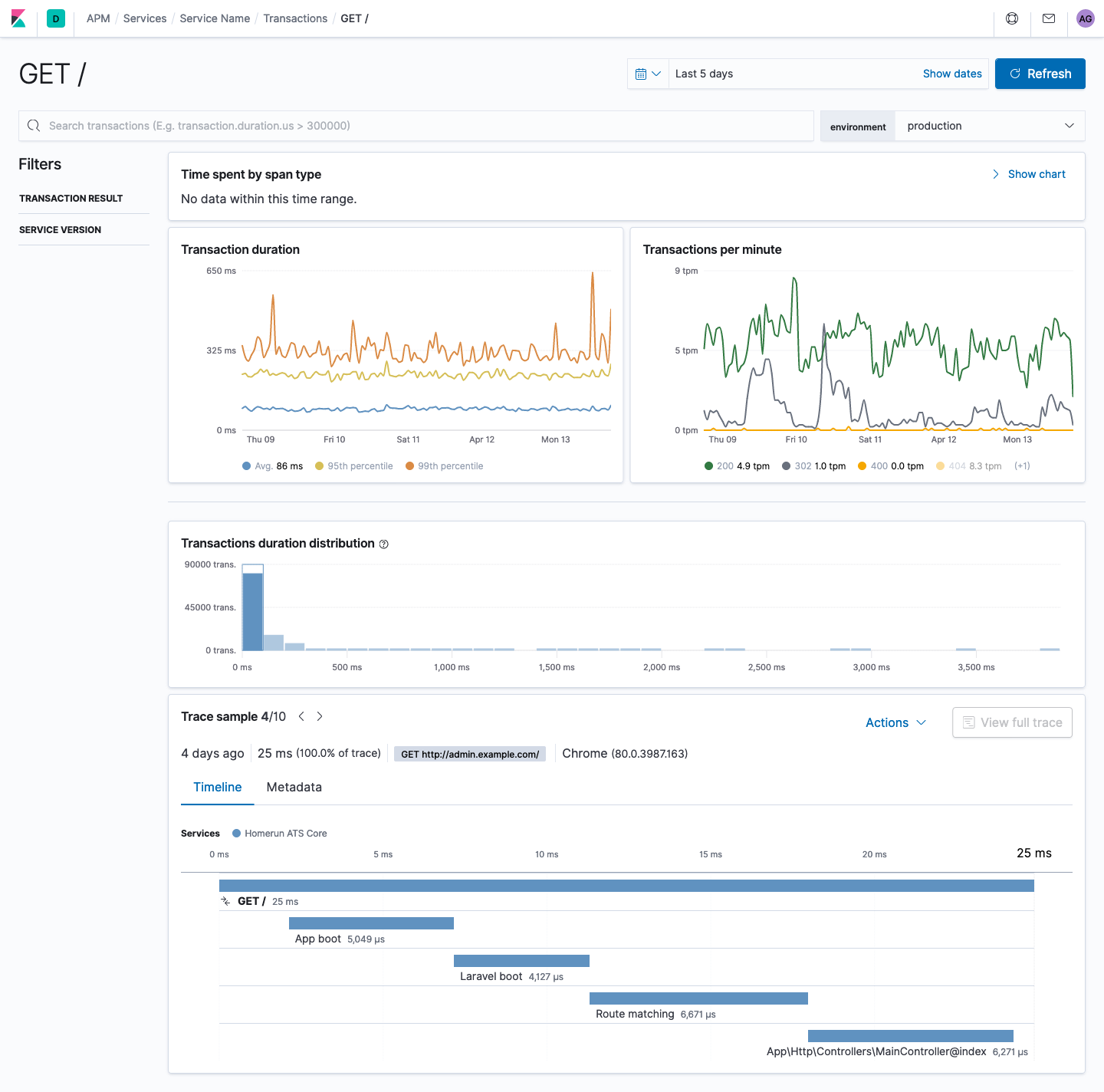shifudeen / elastic-apm-laravel
Laravel APM agent for Elastic v2 intake API
Installs: 11
Dependents: 0
Suggesters: 0
Security: 0
Stars: 0
Watchers: 0
Forks: 18
pkg:composer/shifudeen/elastic-apm-laravel
Requires
- php: >=7.1
- illuminate/database: ^5.5|^6|^7
- illuminate/http: ^5.5|^6|^7
- illuminate/routing: ^5.5|^6|^7
- illuminate/support: ^5.5|^6|^7
- jasny/dbquery-mysql: ^2.0
- philkra/elastic-apm-php-agent: master
Requires (Dev)
- codeception/codeception: ^4.1
- codeception/mockery-module: ^0.4.0
- codeception/module-asserts: ^1.0.0
- dms/phpunit-arraysubset-asserts: ^0.1.0
- friendsofphp/php-cs-fixer: ^2.16
- symfony/service-contracts: ^2.0
This package is auto-updated.
Last update: 2026-01-23 23:12:58 UTC
README
Elastic APM agent for v2 intake API. Compatible with Laravel 5.5+.
| Transactions list | Transaction detail |
|---|---|
 |
 |
Installation
Require this package with composer:
composer require shifudeen/elastic-apm-laravel
Add the ServiceProvider class to the providers array in config/app.php:
'providers' => [ // ... more providers \AG\ElasticApmLaravel\ServiceProvider::class, ],
From here, we will take care of everything based on your configuration. The agent and the middleware will be registered, and transactions will be sent to Elastic.
Agent configuration
The following environment variables are supported in the default configuration:
| Variable | Description |
|---|---|
| APM_ACTIVE | true or false defaults to true. If false, the agent will collect, but not send, transaction data; span collection will also be disabled. |
| APM_ACTIVE_CLI | true or false defaults to true. If false, the agent will not collect or send transaction or span data for non-HTTP requests but HTTP requests will still follow APM_ACTIVE. When APM_ACTIVE is false, this will have no effect. |
| APM_APPNAME | Name of the app as it will appear in APM. Invalid special characters will be replaced with a hyphen. |
| APM_APPVERSION | Version of the app as it will appear in APM. |
| APM_SERVERURL | URL to the APM intake service. |
| APM_SECRETTOKEN | Secret token, if required. |
| APM_USEROUTEURI | true or false defaults to true. The default behavior is to record the URL as defined in your routes configuration. Set to false to record the requested URL, but keep in mind that this can result in excessive unique entries in APM. |
| APM_IGNORE_PATTERNS | Ignore specific routes or jobs by transaction name. Should be a regular expression, and will match multiple patterns via pipe | in the regex. Note that 4 backslashes should be used to match a single backslash. Example: "/\/health-check|^OPTIONS |Foo\\\\Bar\\\\Job/" |
| APM_QUERYLOG | true or false defaults to 'true'. Set to false to completely disable query logging, or to auto if you would like to use the threshold feature. |
| APM_THRESHOLD | Query threshold in milliseconds, defaults to 200. If a query takes longer then 200ms, we enable the query log. Make sure you set APM_QUERYLOG=auto. |
| APM_BACKTRACEDEPTH | Defaults to 25. Depth of backtrace in query span. |
| APM_MAXTRACEITEMS | Defaults to 1000. Max number of child items displayed when viewing trace details. |
You may also publish the elastic-apm-laravel.php configuration file to change additional settings:
php artisan vendor:publish --tag=config
Once published, open the config/elastic-apm-laravel.php file and review the various settings.
Collectors
The default collectors typically listen on events to measure portions of the request such as framework loading, database queries, or jobs.
The SpanCollector in particular allows you to measure any section of your own code via the ApmCollector Facade:
use AG\ElasticApmLaravel\Facades\ApmCollector; ApmCollector::startMeasure('my-custom-span', 'custom', 'measure', 'My custom span'); // do something amazing ApmCollector::stopMeasure('my-custom-span');
To record an additional span around your job execution, you may include the provided job middleware (Laravel 6+ only https://laravel.com/docs/6.x/queues#job-middleware):
public function middleware() { return [ app(\AG\ElasticApmLaravel\Jobs\Middleware\RecordTransaction::class), ]; }
Add a collector for other events
You can add extra collector(s) to listen to your own application events or Laravel events like Illuminate\Mail\Events\MessageSending for example. We created a base collector that already includes functionality to measure events, that you can extend from:
// app/Collectors/MailMessageCollector.php namespace YourApp\Collectors; use AG\ElasticApmLaravel\Contracts\DataCollector; use AG\ElasticApmLaravel\Collectors\EventDataCollector; use Illuminate\Mail\Events\MessageSending; use Illuminate\Mail\Events\MessageSent; class MailMessageCollector extends EventDataCollector implements DataCollector { public function getName(): string { return 'mail-message-collector'; } protected function registerEventListeners(): void { $this->app->events->listen(MessageSending::class, function (\Swift_Message $message) { $this->startMeasure( 'mail #' . $message->getId(), 'mail.delivery', ); }); $this->app->events->listen(MessageSent::class, function (\Swift_Message $message) { $this->stopMeasure('mail #' . $message->getId()); }); } }
Don't forget to register your collector when the application starts:
// app/Providers/AppServiceProvider.php use AG\ElasticApmLaravel\Facades\ApmCollector; use YourApp\Collectors\MailMessageCollector; public function boot() { // ... ApmCollector::addCollector(MailMessageCollector::class); }
Development
Get Composer. Follow the instructions defined on the official Composer page, or if you are using homebrew, just run:
brew install composer
Install project dependencies:
composer install
Run the unit test suite:
php vendor/bin/codecept run unit
Please adhere to PSR-2 and Symfony coding standard. Run the following commands before pushing your code:
php ./vendor/bin/php-cs-fixer fix --config .php_cs
